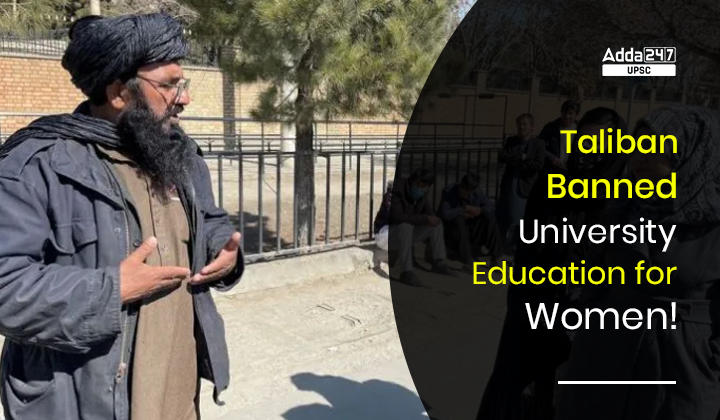Table of Contents
Relevance of Taliban’s Ban on University Education for Afghani Women
Taliban Banned University Education for Afghani Women: The latest Taliban restriction on female education in Afghanistan is likely to raise concerns in the international community. It covers GS Paper 2: International Relations – India and its neighbourhood relations.
What is the Issue?
- The Taliban government has passed an order to suspend university education for all female students in Afghanistan.
- The education ministry under Taliban Regime said that the decision was made in a cabinet meeting and the order will go into effect immediately.
- The announcement came as the United Nations Security Council met in New York on Afghanistan.
UN Report on Taliban Regime: Focus of al-Qaeda Shifts to India
How Taliban Government Impacting Female Education in Afghanistan?
- Nearly a year after the Taliban seized control, Afghanistan has notoriously become the world’s only country where girls are forbidden from taking modern education.
- In a cruel U-turn, the Taliban in March blocked girls from returning to secondary schools on the morning they were supposed to reopen. In March, Taliban ordered schools for girls to shut just hours after they were due to reopen following months long closures imposed after the Taliban takeover in August 2021.
- In November, Afghan women prevented from entering amusement parks in Kabul as the government announced restrictions on women being able to access public parks. funfairs, gyms and public baths.
- Women were allowed to appear in University Entrance Exam but with restrictions on the subjects they could apply for, with engineering, economics, veterinary science and agriculture blocked and journalism severely restricted.
- Women have been pushed out of many government jobs or are being paid a slashed salary to stay at home.
- They are also barred from travelling without a male relative, and must cover up outside the home, ideally with a burqa.
Engaging the Taliban: India- Afghanistan Relations
Why Taliban opposes Female Education?
The Taliban adhere to an austere version of Islam, with the movement’s supreme leader, Hibatullah Akhundzada, and his inner circle of Afghan clerics opposed to modern education, particularly for girls and women.
Taliban Rule in Afghanistan and Its Implications for India

History of Taliban taking U-Turn on Female Education
- The Taliban, which ruled over Afghanistan from 1996 until 2001, when the US-led invasion forced the group from power, have historically treated women as second-class citizens, subjecting them to violence, forced marriages and a near-invisible presence in the country.
- After seizing power in Afghanistan last year, the Taliban attempted to project a more moderate image to gain international support.
- But while it has has made numerous promises to the international community that it would protect the rights of women and girls, the Taliban has been doing the opposite, systematically clamping down on their rights and freedoms.
What will be the consequences of banning university education for Women?
- Banning University Education for Women is like a recurring nightmare stretching over generations.
- With the implementation of the latest decree, half of the Afghan population will soon be unable to access education beyond primary school.
- Women in Afghanistan can no longer work in most sectors, require a male guardian for long-distance travel and have been ordered to cover their faces in public.
- They have also imposed limits on girls’ education, banning women from certain workplaces as they stripped away rights they had fought tirelessly for over the last two decades.
Taliban Takes control of Afghanistan
How will it affect the future of Taliban?
- The Taliban’s decision to ban university education for women will have significant consequences for the Taliban and will further alienate the Taliban from the international community and deny them the legitimacy they desire.
- The Taliban are making it clear every day that they don’t respect the fundamental rights of Afghans, especially women.
- Taliban cannot expect to be a legitimate member of the international community until they respect the rights of all Afghans, especially the human rights and fundamental freedoms of women and girls
It will further Economic Crisis in Afghanistan
- The country has been reeling from a humanitarian crisis with more than half of the population facing hunger, amid Western-imposed sanctions, as well as the freezing of humanitarian aid and nearly $10bn in Afghan central bank assets.
The Editorial Analysis: India must directly engage with Taliban 2.0
Recent IR Articles:
| Exercise “SURYA KIRAN-XVI” 2022 | Indo-Greek Conference 2022 | India-China Face Off in Tawang: know Everything for UPSC | What is SAARC Currency Swap Framework? | RBI Signed Agreement With Maldives |
| How BIMSTEC Can Build a New South Asian Regional Order?: The Hindu Editorial Analysis | First India-Central Asia Meeting of NSAs: Significance for Regional Security? | India’s G20 Presidency- 1st Sherpa Meeting Begins | What is Sylhet-Silchar Festival 2022? | All Details for UPSC |
| UNESCO India Africa Hackathon 2022 is being Organized in Uttar Pradesh | What is India-Australia FTA? | Know Everything about AI-ECTA for UPSC | What is India-Bangladesh Friendship Pipeline (IBFPL)? | What is Bali Yatra of Odisha? | Significance for UPSC |
| Removal of India from US’ Currency Monitoring List: Possible Outcomes for India? | 2nd BIMSTEC Agriculture Ministers Meeting 2022 | Russia’s loss in Kherson- Russia Withdrew from Kherson | Indo-Pacific Regional Dialogue 2022 (IPRD-2022) |
| COP 19 CITES Meeting 2022- Relief provided to Indian Handicraft Exporters | G20 Summit 2023- India’s G20 Presidency & Tourism Opportunities for N-E States | India’s “In our LiFEtime” Campaign Launched at COP 27, Sharm El-Sheikh | 19th ASEAN-India Summit 2022- Key Outcomes and Way Forward |



 TSPSC Group 1 Question Paper 2024, Downl...
TSPSC Group 1 Question Paper 2024, Downl...
 TSPSC Group 1 Answer key 2024 Out, Downl...
TSPSC Group 1 Answer key 2024 Out, Downl...
 UPSC Prelims 2024 Question Paper, Downlo...
UPSC Prelims 2024 Question Paper, Downlo...




